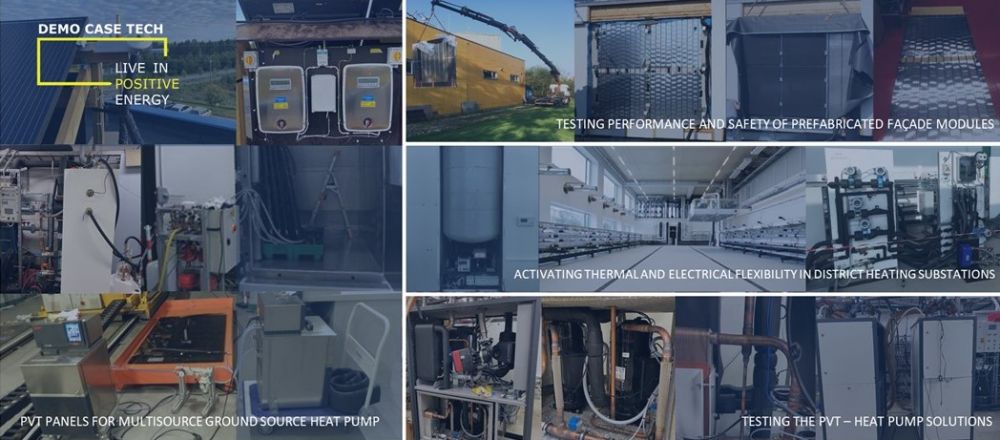Technology performance tests wrapped up for demo sites
3 March 2021
EXCESS partners recently completed a series of tests of the innovative technologies that will be installed in the four demo sites. Technology developers – with the assistance of research organizations - performed operating, safety and performance tests in controlled environments. Tests are essential to ensure that solutions packages combining multiple technology products integrate seamlessly. Moreover, tests serve the important purpose of building confidence of the demo owners, building developers and end-users about the reliability, resilience and safety of the advanced energy solutions to be implemented. Technical details with regard to the testing phase are documented in the deliverables associated with work package 2.
Design principles and test result of multisource Solar Assisted heat
Project partner VTT carried out simulations to design the test rig, whilst partners GEBWELL and TAS developed the rig and executed tests. The testing phase is currently still ongoing. GEBWELL tested the use of two different compressor technologies, namely a 100kW inverter piston compressor and a 100kW enhanced vapour injection (EVI) scroll compressors. Both technologies have been proven to work well technically. Further, the partner is working on the integration of the heat pump controller into the company’s cloud infrastructure and has begun testing the PVT panels connected to the heat pump. Upcoming tasks include the optimisation of the heat pump frame design to minimize noise pollution, running through the heat pump performance (COP) at different operating conditions, continuing work on IoT integration and the analysis of the PVT test data. This may be a breakthrough a for densely built environment areas (heating dominated, recharging ground) as the heat pump market is booming.
Testing performance and safety of prefabricated façade modules
Project partner AEE INTEC has designed and tested multifunctional façade modules (electricity generation, heating and cooling) that can be mounted to the exterior of an existing building to improve its energy performance. Heat transfer simulations took into account pipe configurations, insulation standards / requirements, wall configurations and boundary conditions. The final design, which has undergone performance and safety tests, is composed of a metal construction that achieves a high insulation standard (<0,15W/m²K), is characterized by a high degree of prefabrication (1-2 modules per floor) and features a high performing active layer (copper pipes with aluminum heat conductive plate).
Thermo-fluid dynamic & electrical analyses and leakage tests
Project partner DUALSUN has carried out tests of PVT panels, optimised to power a multisource ground source heat pump. The analyses focused on different fluids, pressures, the cost and certification compliance of the improved PVT. Pressure tests sought to optimize the PVT hydraulics to increase the functioning pressure to more than the current 1.2 bar (aiming for 1.5 bar). Tests also explored switching the system’s glycol-based fluid with an ethanol-based fluid. The PVT hydraulics will be tested with the new fluid in the near future.
Borehole collector degradation, structural, safety and performance tests
In preparation for the installation of 800m deep boreholes in the Finish demo case, TAS studied available technologies, drilling machinery and methods to reach such depths. The two options considered are Air Down the Hole (DTH) hammer drilling and Water Down the Hole hammer Drilling (water as a drilling energy carrier). TAS is in discussions with two leading drilling companies to explore the air drilling approach. In the meantime, partner MUOVITECH has been creating a building model energy simulation to understand energy demand. Also, simulations of the thermal loads and seasonal specific heat extraction rates were carried out. Based on the findings, MUOVITECH has developed the specifications of the deep borehole collectors (hydronic & borehole design settings for flow rates, pressure and antifreeze fluid to be used, etc.).
Testing of the integrated controller
Project partner CENER is developing the hardware for an integrated controller to manage energy generated on-site from RES. The controller will feature advanced control functionalities such as predictive control, based on weather and building load forecasting (harnessing machine learning techniques). Recognising the importance of a user-centric approach, the system is managed and monitored through a state-of-the-art HMI (Human Machine Interface). Initial lab testing was carried out in September 2020 and next steps include testing the controller in an operational environment. Validation tests of the PV system, Li-ion battery and integrated controller are being prepared and validation tests for battery management (incorporating demand and weather forecasting) will commence in the near future.
Activating thermal and electrical flexibility in district heating substations
Setting the groundwork for improved PEB district heating integration, project partner VITO (with support from ClimaWays) has been making significant progress. Advances in development were made regarding the serial bus communication with central master/individual substations, SOC determination of the storage tanks, improving the power to heat element (currently no external control possible) and interface development to read data and change set points. Lab tests in a thermo-technical lab included the evaluation of different additional T-sensors in/on a boiler, measuring the actual SOC and validating the derived model as well as testing the set-up of device communication. All lab and communication tests are finished with only the boiler model training ongoing.
Do a tour to the demo sites virtually by exploring our demo site video tours on YouTube here and read more about each demo site (Graz, Granada, Helsinki and Hasselt) and upcoming milestones on the EXCESS demo site webpages.
All news
